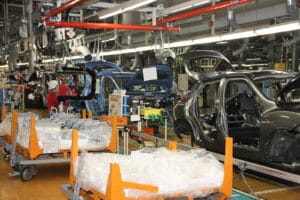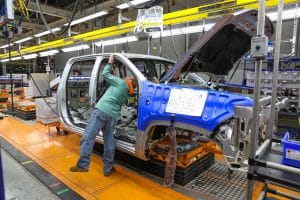
This story has been updated with new information.
Nissan and Honda have been forced to cut vehicle production due to a worsening shortage of the semiconductor chips required in ever increasing numbers for today’s high-tech vehicles, with other manufacturers, including General Motors, Daimler, Volkswagen and Renault, warning they may need to take similar steps.
To operate their infotainment, advanced safety and powertrain control technologies, automakers require substantial numbers of chips for every vehicle, but experts warn they are facing increased competition from consumer electronics companies and other users amidst a shortage of supply.
“A global shortage of semiconductors has affected parts procurement in the auto sector,” Nissan said in a statement. “As a result of this shortage, the Oppama Plant in Japan will adjust production in January, reducing production of the Nissan Note.”
(Volvo set to increase EV capacity as sale surge.)
The problem isn’t just limited to foreign makers in their home countries. Ford revealed Friday it will send home 3,900 employees at its Louisville Assembly Plant for a week due to the chip shortage. The workers build the Ford Escape and Lincoln Corsair. It’s the only Ford plant impacted at this point.

American dealers could soon see shortages as other automakers prepare to trim production due to chip shortages. And that would happen just as the industry is struggling to rebuild vehicle inventories severely impacted by production cuts due to the COVID-19 pandemic last year.
While Honda officials now say they have “secured (chip) inventories” to keep their lines running through the end of this month, Japanese news outlet Nikkei said the third-largest of that country’s automakers actually will cut 4,000 vehicles out of its January schedule, while quoting a “source familiar with the matter” warning that, “The period starting in February may be grim.”
Japanese home market production has been particularly hard hit due to a major fire that severely damaged a chip plant owned by a subsidiary of Asahi Kasei Corp. last October.
But other factors have contributed to the problem. Industry planning was thrown out of whack when the pandemic struck last year. In China, the world’s largest automotive market, vehicle sales fell by more than 90% during early lockdowns, demand in Europe plunging by more than half. The U.S. experienced a decline topping 40% at peak in March and April, but it quickly started to rebound, despite forecasts that sales could slide as much as 80% before beginning a slow recovery.
Worldwide, vehicle sales slipped 17% for the year, according to industry data, but recent months have seen demand surge, even as COVID-19 infections have accelerated. So, if anything, manufacturers have had to accelerate production in a frantic bid to refill inventory pipelines drained by factory shutdowns that, in North America lasted for two months.

“The auto market recovery from the COVID crisis was faster than expected” because of economic stimulus measures the world over, as well as people purchasing vehicles to avoid having to take public transportation, Masashi Okada of the consultancy Arthur D. Little Japan, told the Nikkei.
Meanwhile, demand for chips has accelerated from other sectors, including the consumer electronics industry ramping up offerings of everything from smartphones and video game consoles to Internet-of-Things, or IoT, devices like smart light switches and WiFi-operated coffee pots and refrigerators.
(Automakers and suppliers plan major presence at “virtual” CES.)
Volkswagen was one of the first automakers to signal the coming chip shortage, the German company warning last month of the need to adjust production in Europe, China and North America.
But the list of companies that may need to take similar steps is growing rapidly.
Daimler AG Chairman Ola Kallenius said it is “too early to tell” what impact the shortages will have on the company, which produces Mercedes-Benz and Smart vehicles. But he acknowledged in public comments that some production adjustments seem likely.

General Motors and Renault have also acknowledged concerns about supplies.
Today’s cars often have more computer processing power onboard than a well-equipped home or office. Digital technology is used for the latest touch- and voice-controlled infotainment systems and advanced driver assistance systems using radar, lasers and cameras to avoid accidents. But even the increasingly popular heated, cooled and powered seats need semiconductor chips to operate, as do today’s powertrain controllers. New electric vehicles are only accelerating demand at a rapid pace.
In many cases, automakers find themselves stuck on the sidelines dependent upon vendors to address shortages, as companies like Bosch – the world’s largest auto supplier – provide a majority of the smart components used in today’s vehicles.
The German company told the Financial Times it is receiving “significantly fewer” chips than expected, with other key suppliers such as Valeo and Continental expressing similar concerns.
(Mercedes Hyperscreen takes in-car video displays to new extreme.)
If anything, the competition for chips is only expected to accelerate going forward, experts warn. But due to the complexity and cost of setting up new semiconductor plants, supply shortages may not be easily resolved.







